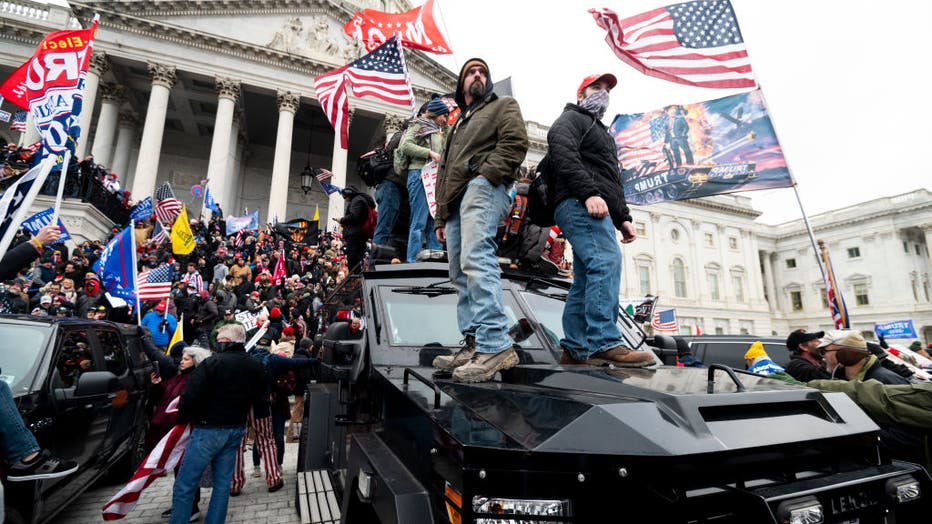Gov. Ron DeSantis cites Capitol mob as reason to push anti-riot bill

TALLAHASSEE - Republican Florida Gov. Ron DeSantis, a strong ally of President Donald Trump, said Wednesday’s storming of the U.S. Capitol by Trump supporters is an argument for his proposed legislation to get tougher on protests that turn violent.
DeSantis had previously announced he wanted to create tougher penalties for violent protesters in the wake of demonstrations nationwide sparked by the death of George Floyd, a Black man who died after a Minneapolis police officer pressed his knee into Floyd’s neck for several minutes.
On Thursday, DeSantis condemned the Washington mob that violently disrupted the Electoral College certification.
| SIGN UP FOR THE FREE FOX 35 NEWSLETTER |
"What you saw yesterday was a good example of taking a rally and having certain views and then going in to storm the Capitol like was done is totally unacceptable and those folks need to be held accountable." DeSantis said. "It doesn’t matter what banner you’re flying under, the violence is wrong."
DeSantis announced in September that he would seek wide-ranging legislation to punish protesters who turn violent. Coincidentally, bills were filed Wednesday to address his proposal.
RELATED: 'Those folks need to be held accountable' Gov. DeSantis denounces U.S. Capitol rioters
The 60-page bill would enhance penalties for crimes committed during a riot or violent protest, not allow people arrested during such a demonstration to be released from jail before a first court appearance and create new felonies for organizing or participating in a violent demonstration.

UNITED STATES - JANUARY 6: Trump supporters stand on the U.S. Capitol Police armored vehicle as others take over the steps of the Capitol on Wednesday, Jan. 6, 2021, as the Congress works to certify the electoral college votes. (Photo By Bill Clark/C

Protesters interact with Capitol Police inside the U.S. Capitol Building.
It would also strip local governments of civil liability protections if they interfere with law enforcement’s efforts to respond to a violent protest and add language to state law that could force local governments to justify a reduction in law enforcement budgets.
The proposal would also make it a second-degree felony to destroy or demolish a memorial, plaque, flag, painting, structure or other object that commemorates historical people or events. That would be punishable by up to 10 years in prison.
While DeSantis used the Trump supporters storming the U.S. Capitol to make his point, Democrats said the genesis of the legislation was to try to suppress activists supporting violence against African Americans.
"The thing that gave birth to this idea of his and other Republicans in power in Tallahassee was to try to quash the voices of African Americans," said Democratic Rep. Evan Jenne. "To compare anything that happened this summer with what happened yesterday, forget about apples and oranges. It’s the difference between a blackboard and a knife. It’s not even remotely similar."
RELATED: Florida's DeSantis moves to allow citizens to shoot looters, rioters targeting businesses
Democratic Rep. Anna Eskamani said DeSantis is a hypocrite, because as a Trump ally, he encouraged the president’s supporters. She said he’s now using their violent actions to promote proposed legislation she believes was aimed at helping Trump’s election.
"It’s disingenuous for Gov. Ron DeSantis is trying to rewrite history, as we all know, that this bill concept came out of his attempt to flame racial tensions for political points," Eskamani said. "He has always been Trump’s biggest fan, Trump’s biggest advocate and the bill includes protection for Confederate monuments."
Still, DeSantis said he doesn’t support any lawlessness and promoted the legislation at a news conference in Bradenton.
"I’m the first governor to really take this very seriously with my legislation," he said. "Not everyone agreed with that legislation. There’s some people trying to say it wasn’t a big deal to have some of these things going on — you go back to the summer, some of the commentary — I disagreed with that."

